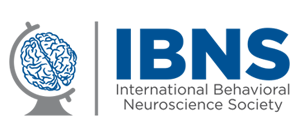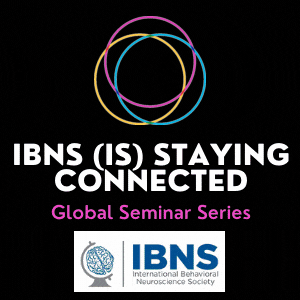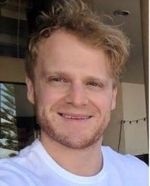|
Join us for a LIVE speaker seminar followed by a Q&A
Thursday, December 9, 2021 (5:00 pm-6:00 pm EST)
The International Behavioral Neuroscience Society is proud to announce the commencement of a new virtual, global seminar series for early career researchers, “IBNS(is) Staying Connected.”
Dr. Fatin Atrooz Early-life Sleep Deprivation and Alcohol Intake: Insights from a Rat Model Dr. Fatin Atrooz obtained her PhD in behavioral neuroscience from the University of Houston, Texas, USA, in 2018. Her dissertation work was focused on understanding the mechanistic basis of early life sleep deprivation-induced behavioral deficits in a non-intrusive rat model of sleep deprivation. She continued to expand her dissertation work in her post-doctoral studies by joining the lab of her dissertation mentor Dr. Samina Salim as a postdoctoral fellow. Currently, she is engaged in both pre-clinical as well as human subject work. Her pre-clinical studies are focused on examining the impact of early life sleep deprivation on alcohol intake using the early life sleep deprivation rat model which she had established during her dissertation work. Her goal is to investigate and reveal the molecular changes in the brain reward circuitry following early life sleep deprivation that may predispose adolescents to alcohol intake. Her human subject work involves examining the mental wellbeing and the biochemical consequences of stress and trauma exposure in Syrian refugees resettled in Houston, with the goal of identifying biological markers of stress in this vulnerable population.
Register Today!
Ethics and Diversity Committee Susan Sangha, Chair, Purdue University, West Lafayette, IN, USA 2022
The International Behavioral Neuroscience Society is proud to announce the commencement of a new virtual, global seminar series for early career researchers, “IBNS (is) Staying Connected.” We will be kicking off this series with a session hosted by Dr. Nicholas Everett (Trainee Representative to Council) and Dr. Anand Gururajan (Ethics and Diversity Committee member) on Thursday December 9, 2021 (5pm-6:15pm EST) which will feature 2 speakers who are either late-stage PhD students or postdoctoral researchers. Each speaker will be given 20 minutes to present their research, followed by 5 minutes of introspection about their own methods, data, and future directions, and finished off with a 5-10 minute Q&A. This will provide the selected ECRs with a unique opportunity to engage with the IBNS membership. If you’re interested in being one of the two speakers, please submit a 200-word abstract of your research and a 150-word diversity statement November 15, 2021 (11:59pm EST) using the application link below. For our inaugural seminar, you will need to be an IBNS member in order to apply. Your abstract should clearly articulate your research question and approach, the interpretation of your findings and their implications, the innovativeness and impact of these findings, and should incorporate behavior. For the diversity statement, you should describe ways in which you have made efforts or plan to make future efforts to promote diversity and inclusion, with regards to culture, ethnicity, gender identity or expression, national origin, physical or mental difference, politics, race, religion, sex, sexual orientation, socio-economic status, and/or subculture, as described in the IBNS Diversity Statement. A statement evaluated as Outstanding would include specific examples (e.g. partnering organizations, collaborators, and/or applicant led-initiatives/programs) of things that have been done or being planned, as well as a clear explanation how these examples promote diversity and inclusion within the field of behavioral neuroscience. If you cannot apply in time for 15th November, don't stress! In the lead up to the 2022 IBNS Conference (7-11 June, 2022), IBNS is Staying Connected will host 6x fortnightly seminars, giving 12 speakers this same opportunity. The call for abstracts for these seminars will be announced in early 2022, so keep an eye out for it! |



